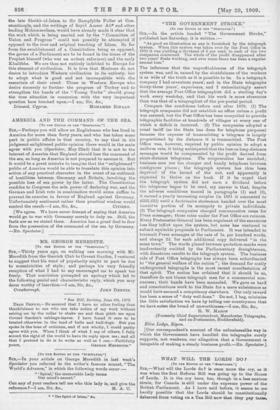"THE GOVERNMENT STROKE." ITO TIN EDITOR or TUN " ROUT
OR."1
Sin,—In the article headed " The Government Stroke," published last Saturday, it is written :— " As good an illustration as any is furnished by the telegraph system. When this system was taken over by the Post Office in 1870 it was yielding a dividend of 6 per cent. to each of the two companies concerned. The whole of the profit disappeared after two years' State working, and ever since there has been a regular annual loss."
The inference that the unprofitableness of the telegraph system was, and is, caused by the slothfulness of the workers is as wide of the truth as it is possible to be. In a telegraph company I had seventeen years', and in the State telegraphs thirty-three years', experience, and I unhesitatingly assert that the average Post Office telegraphist did a sterling day's work every weekday, and that his work is more strenuous than was that of a telegraphist of the pre-postal period.
Compare the conditions before and after 1870. (1) The telegraph companies did not establish an office unless a profit was assured, but the Post Office has been compelled to provide telegraphic facilities at hundreds of villages at every one of which a deficit is incurred. (2) The companies adopted a zonal tariff (as the State has done for telephone purposes) because the expense of transmitting a telegram is largely proportioned by the distance it is transmitted. The Post Office was, however, required by public opinion to adopt a uniform rate, it being anticipated that the loss on long-distance messages would be compensated by the profit derived from short-distance telegrams. The compensation has vanished; business men use the cheaper and handy telephone between contiguous places ; the telegraph system has thus been deprived of the kernel of the nut, and apparently is expected to thrive on the husk. If it be urged that the telegraph system did not earn a dividend before the telephone began to be used, my answer is that, despite the adverse conditions named in paragraphs (1) and (3), it earned a yearly increasing surplus (in 1881 it amounted to .C326,432) until a doctrinaire statesman handed over the most lucrative portion of its monopoly to private individuals. (3) The telegraph companies charged remunerative rates for Press messages; those rates under the Post Office are ruinous. Every Postmaster-General has been cognisant of the enormous loss they inflict upon the system, but none has ventured to submit equitable proposals to Parliament. It was intended to transmit Press messages at the rate of ls. per hundred words, and charge 2d. for each additional copy delivered "in the same town." The words placed between quotation-marks were inadvertently omitted by the Parliamentary draughtsman, with disastrous results to the telegraph system. The business side of Post Office telegraphs has always been subordinated to "the general welfare of the nation"; the demand for costly underground telegraphs is the most recent manifestation of that spirit. The nation has ordained that it should be so, therefore do not blame telegraph men for a commercial non. success ; their hands have been manacled. We gave as hard and conscientious work to the State for a mere subsistence as would have secured a competency elsewhere. Our only reward has been a sense of "duty well done." Do not, I beg, minimise the little satisfaction we have by telling our countrymen that we have eaten the bread of unworthiness.—I am, Sir, &AL, R. W. MASON
(Formerly Chief Superintendent, Manchester Telegraphs, and ex-Postmaster, Huddersfield).
Mint Lodge, Bizpon.
[Our correspondent's account of the unbneineselike way in which the Government have handled the telegraphs surely supports, nob weakens, our allegation that a Government is incapable of making a steady business profit.—En. Spectator.]






































 Previous page
Previous page